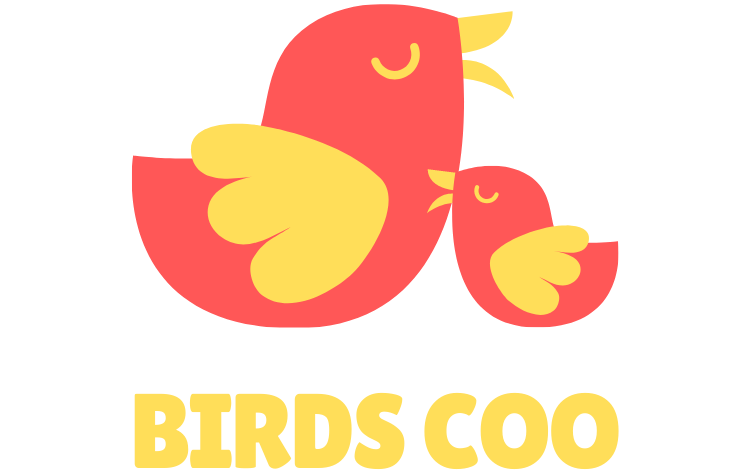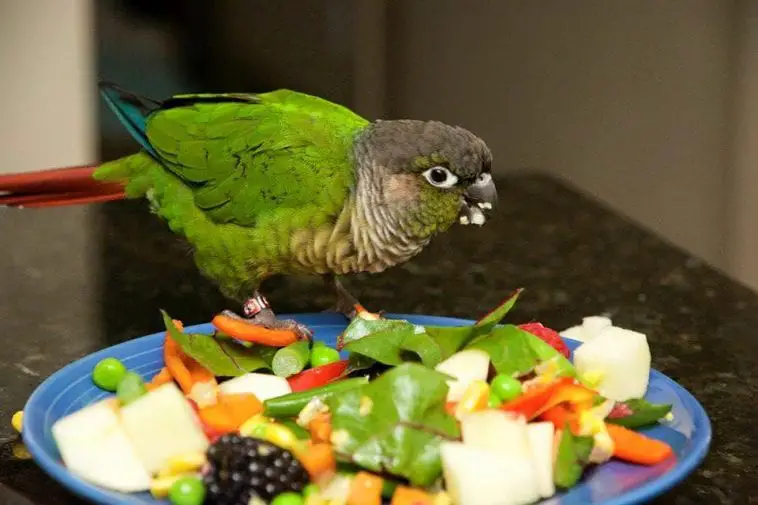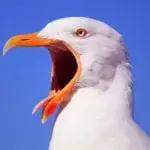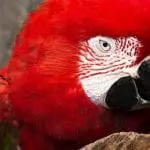Parrots that are given the right kind of food tend to live longer because they have the right nutrients to strengthen their immunity to avoid and have resistance to different diseases or illnesses. As a parrot owner, it is important to have knowledge about the foods that can give nourishment to your pet because not all foods are suitable for them, especially that parrots have a sensitive digestive system. What does a parrot eat seems like simple good-to-know information, but it is one of the most important aspects that you need to master as a bird keeper.
Fruits and vegetables
They are a wide variety of fruits and vegetables that a parrot can eat that will serve as a supplemental meal where they can get additional nutrients and minerals. As a guide in choosing suitable fruits and vegetables, it should be rich in nutrients and minerals but is less in sugar and other elements that will not do good to your parrot. These are some of the fruits that your parrot can eat are asparagus, bananas, apples, grapes, mango, papaya, beets, pomegranate, butternut, passion fruit, peaches, and other citrus fruits.
These are some of the healthy vegetables that are good to parrots broccoli, bell peppers, dandelion greens, corn on the cob, mushrooms, pumpkins, winter squash, tomatoes, sweet potatoes, parsley, onion leeks, carrots, okra, spinach, kale, and hot peppers. In giving your bird fruits and vegetables, avoid those that are easily contaminated with pesticides such as grapes because it may no longer contain nutritional benefits. You can also give your parrot small amounts of protein such as eggs, but it should be cooked, may it be scrambled or hard-boiled.
Wild and foraged foods
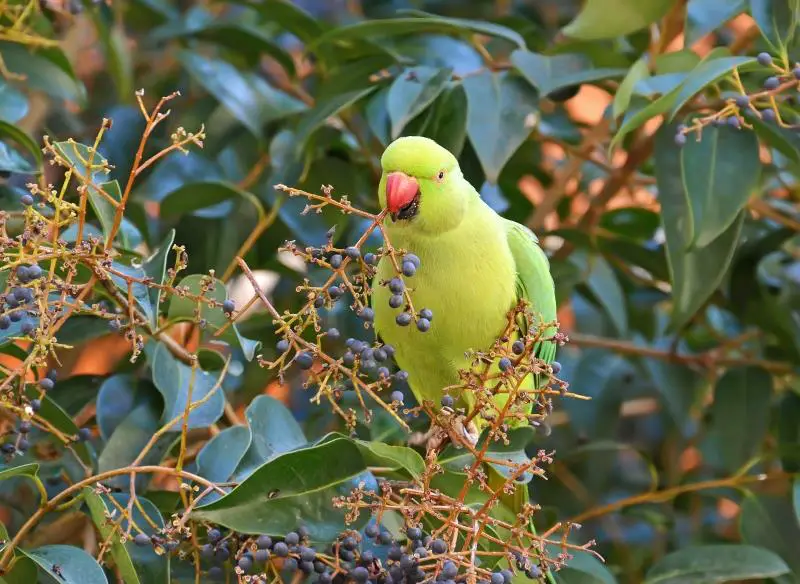
If your bird came directly from the wild, it is advisable to have an idea about the foods that they usually eat. Most of the foods that parrots eat in the wild are those that are green fresh garden produce. If they thrive in the wild healthily, you may need to somehow give your parrot foods that are closer to the foods that they eat in the wild. Most of the foods that they eat in the wild are chickweed, sloes, dandelions, hawthorn berries, sow thistle, blackberries, fat hen plant, and cotoneaster berries.
Nuts and Seeds
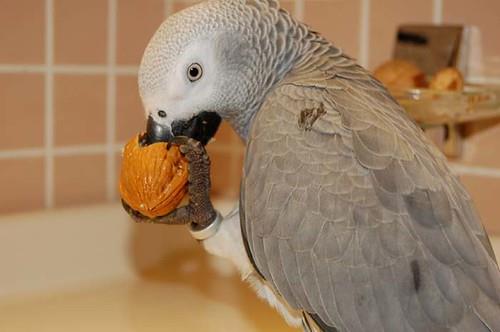
The nuts and seeds are the popular protein foods that parrots feed on whether in the wild or in captivity. These protein foods are high in fats, that is why if you would give it to them, it should be in moderation so as not to avoid accumulated fats that might cause overweight and obesity. The ideal nuts for most bird species are only about one or two nuts per day only depending on the bodily physique of the bird. These are the recommended nuts that they can eat cashews, almonds, brazil nuts, shelled peanuts, pistachios, macadamias, and piece means. Seeds may not be a staple diet for parrots, but it can be considered as a part of a well-balanced diet because it also contains traces of minerals such as zinc, magnesium, and iron. However, seeds shouldn’t only be their sole diet because of its fat content.
Pellets
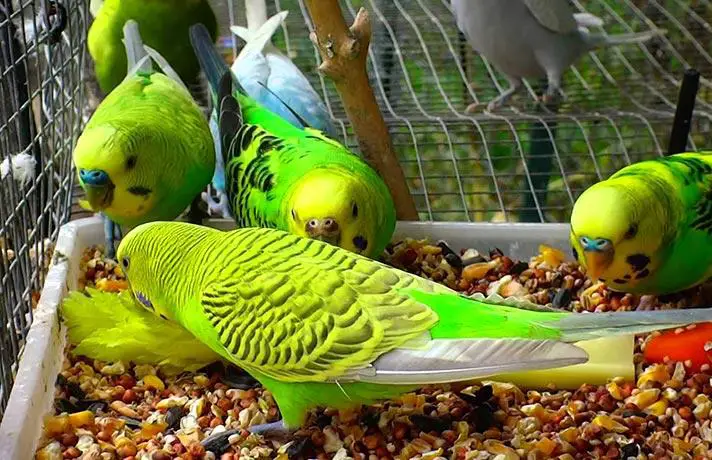
Pellets are given to birds for decades, but the pellets nowadays are more improved that can even be used as a sole diet for your parrot. This is a perfect choice if you are not an expert about the foods that you may give to them. You’ll just have to be careful in choosing for the right kind of pellets because some have fillers and added chemicals that will case negatively to your bird. Pelleted mixes are also a cheap food choice for your avian pet.
Snacks
Snacks are given as treats to parrots. It is advisable to give your parrots snacks that are still healthy if you plan to add extra meals to their usual meal of the day. If you are feeding them pelleted mixes, their snacks can either be fruits or vegetables. You may also give your parrot a new set of foods such as cooked oatmeal, whole wheat bread, cooked legumes (lentils, tofu, peas, beans, and soy products), breakfast cereals and whole-grain pasta. Be careful in giving them cooked white rice, white bread, and mashed potatoes because these are the ones that usually contain high amounts of carbohydrates that are convertible into stored fats.
Are they Considered Herbivore?
Even though parrots are known to feed on fruits and vegetables, they have also considered carnivores because they also eat different kinds of small insects that also a great form of protein. Experts encourage breeders to give their birds insects as food once in a while because it is effective in filling in the needed protein. They can also be fed with pork’s meat or chicken but make sure that it is cooked and in small portions only.
Foods to Avoid That May Harm, Your Parrot
There is a wide variety of foods that you can feed your bird, but there are also foods to avoid. Foods that have little to no nutritional value for humans are those foods that need to be avoided when you are to feed your bird. These foods that need to be avoided are junk foods and those that are high in salt, sugar, and fat content.
Be aware that birds are also lactose intolerant, so don’t give them milk products such as cheese and yogurt as well as beverages with alcohol and caffeine content. If you would give them frozen food, make sure that it is preserved naturally and is free from nitrites, nitrates, MSG, and sulfites. Be strict in giving them foods that they can only eat because eating foods that are not allowed may be fatal.
Tips to Consider in Feeding Your Parrot
- If you are overwhelmed about the types of foods that you can give your parrots, you may consider asking suggestions or advice from a veterinarian expert in avian care so that they can give you some diet plan that is suitable for both you and your parrot.
- If you are to give your parrots commercially available food mixes, make sure to read the label properly. Always check the ingredients and, as much as possible, only choose those that will truly benefit the bird’s health.
- Either fruits and vegetables or pelleted mixes or seeds, make sure that it is always fresh. Do not give your parrot spoiled, moldy, and smelly food items because it may cause irritations and digestive problems. The nutritional value is best achieved through foods that are still in good condition.
- Aside from feeding your parrots healthy foods, water is also important to their diet that helps in proper digestion, so nutrients and minerals are absorbed properly. Water also keeps the bird well hydrated.
Final Thoughts
Knowing what to feed your parrot is one of the most important things to take into consideration in taking them into captivity. Without having proper knowledge about what to feed them is a big risk to their health. With a lot of food selection that can be seen in the market, you need to ensure that it is suitable for the type of parrot species that you have as well as their age.
